|
This site is dedicated to the men and
families of the 196th Ohio Infantry
:
The main goal for this site is to create a detailed History on this regiment.
Here I will try to put together as much information as possible on the movements of the 196th O.V.I. during it's time
of service, even though it was formed at the tail end of the Civil War.
This regiment still endured the long marches and long months of camp life like any other Regiment, and experienced the
deaths of some of thier comrades.
This is also where Decendents and Historians from these soldiers can hopefully get information on thier ancestors or
submit details and photos of thier soldiers to be added with the rest to be compiled here in one place.
:
If anyone has info, details or pictures on the men of the 196th OVI, and would like
to contribute, Please contact me by clicking on "Contact" in the navigation bar above, it would be greatly appreciated.
| Click on image to make larger |
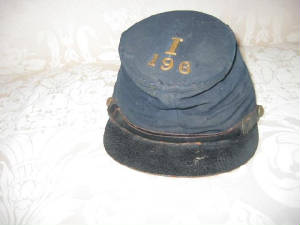
|
| This Kepi or Bummers Cap" Belonged to Pvt. John Blew of Co. I, courtesy Richard Rouse Collection |
| Click on image to make larger |
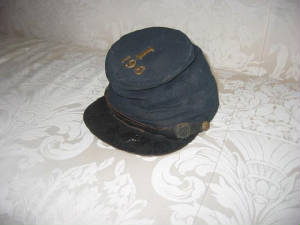
|
| Click on image to make larger |
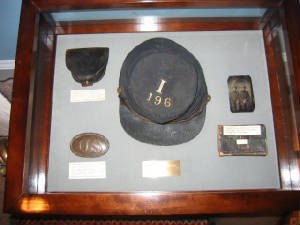
|
| These are Pvt. John Blew's Kepi and other items of Co. I, coutesy of Richard Rouse |
.
.
BASIC HISTORY FROM: DYER'S COMPENDIUM
196th Regiment Infantry. Organized at Camp Chase, Ohio, and mustered in March 25, 1865.
Left State for Winchester, Va., March 26. Assigned to 2nd Brigade, 2nd Provisional Division, Army of the Shenandoah. Duty
at Winchester till July. Moved to Baltimore, Md., garrison duty there and at Fort Delaware till September. Mustered out September
11, 1865.
:
.
.
UNIT HISTORY FROM: "OFFICIAL ROSTER OF THE SOLDIERS OF THE STATE OF OHIO IN THE WAR
OF THE REBELLION" VOL # 10:
This Regiment was organized at Camp Chase Ohio March 25th 1865 to serve one year. It
immediately started for western Virginia, where it was assigned to the Ohio Brigade at Winchester. Here it remained untill
July when it was ordered to Baltimore and assigned to duty in the fortifications around that city, a portion of it being sent
to Fort Deleware. The Regiment was mustered out September 11th 1865. In accordance with orders from the War Department.
:
:
:
:
::::HISTORY OF THE
.......196TH O.V.I.
The winter of 1864/5, the Civil War had been raging for three and a half years, and after
several major battles, the war was finally turning in favor of the Union.
Anxious to end the war and desperate for men, in February 1865 President Lincoln authorized
a $100 bounty to any able bodied man who joined the infantry for one year.
Enticed by the hundred dollars and the increase in pay of sixteen dollars from thirteen a
month, hundreds of men took advantage and enlisted for the one year term of service, many re-enlisting.
:
:
:
Below is Camp Chase as it appeared in 1865, drawn by Albert Ruger of Co. E
| Click on image to make larger |

|
CAMP CHASE:
After enlisting, the men were ordered to report to Camp Chase, camp of instruction located
on the western outskirts of Columbus, Ohio, where present day Fort Hayes is situated.
.
Camp Chase also doubled as a prisoner of war camp, confining hundreds of Confederate POW’s.
.
The stockade that held these prisoners was situated in one corner of the camp, while the rest of the camp had a large
parade ground for organizing and drilling the new union recruits.
.
When the men started arriving, they were assigned to barracks in camp with others that had
arrived there awaiting organization of their regiments.
Below is a typical "Declaration of Intent", filled out by each soldier when he signed
up at his place of enlistment.
This is Thomas Thompson's of Co. G
| Click on image to make larger |
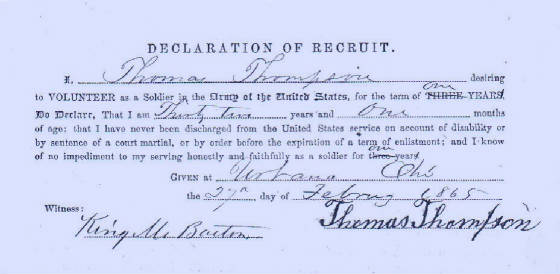
|
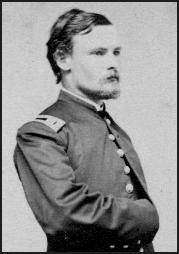
|
| Col. Robert P. Kennedy |
MUSTER:
After the organizing of the Companies, the regiment was mustered in starting with Companies
A,B, and C mustering in on Tuesday March 21st, followed by Companies D and E on Wednesday March 22nd, F and G on Thursday
March 23rd and H, I, and K on Saturday March 25th.
.
The 196th mustered in with 984 strong, under the command of Colonel Robert Patterson Kennedy, and was assigned to the
2nd brigade, 2nd Provisional Division, Army of the Shenandoah, under Major General Philip Sheridan.
.
About two thirds of the 196th was made up of veteran men who had already served in other regiments during the war, but,
their terms of service had expired, so they re-enlisted with the 196th.
.
Thirty six of the thirty eight officers of the 196th were also experienced seeing two or more
years of service in other regiments.
.
When the organizing of the Companies was completed, the men were issued their new uniforms, and equipment.
.
This consisted of a musket, bayonet and scabbard, canteen, blanket, frock coat, haversack
and cartridge box, then the monotony of soldier schooling began, drilling and more drilling, and how to take orders.
CORRESPONDENCE:
This is from a reporter with the Delaware County News of the time, and gives a good accounting
of what was happening at Camp Chase when the 196th was organizing; telling what it was like for the new recruits, the sickness
that was affecting the whole camp and IT makes reference to at least 6000 Confederate Prisoners still at Camp Chase when the
men started arriving there
:
:
March 8, 1865:
Correspondence of Del. News. Camp Chase, O. March 8, 1865. Delaware County News
March 9,1865 Editor Delaware County News:- General Mud is the ranking officer at present in this camp. It is
found on all sides, in the barracks as well as on the outside.-- Several times when the rolls were called in some of the new
companies, some of the smaller boys were missing -- supposed to have deserted -- but, to the great gratification of their
officers, during the pleasant weather of yesterday and Monday, while the attachés of the Government Boarding House were engaged
in cleaning up around the building, they un-earthed the little fellows from beneath the mud, who had just enough life left
to call for more "sow-belly." A great many new recruits throng the camp, many of them being regular Sardines, and numerous
"sells" are practiced upon them by the "vets" such as "checking their baggage " sending them to Col. Neff to "trade boots"
or to the chaplain for "Kinnikinnick." Watch-trading and "selling passes" is also carried on extensively, a new recruit often
giving fifteen dollars for a forged pass, or fifty dollars for an old "bulls eye" worth about three dollars. In the hands
of the "old uns" their big bounties are disappearing like the due of morning before the hot arm, but the poor fellows will
be wiser if they live to come home.
:
March 8, 1865:
Correspondence of Del. News. Much sickness prevails here. All the
hospitals are crowded to excess. Even the chapel has been converted into a hospital. Many are dying -- some very suddenly.
A number who but recently left home and friends, buoyant with hope and prospect of a safe return at the end of their term
of service, are now quietly sleeping their last long sleep in "Green Lawn." But this is a nice "city of the silent dead,"
and they can sleep their very well. I dropped in upon Dr. Longwell and his estimable lady, and found them administering to
the wants of the sick.-- The sick boys say they could not do without Mrs. L., Mrs. Brown, Mrs. Matthews, and Mrs. Jackson
in the wards or in the cook-room.
:
March 9, 1865:
Delaware County News March 9,1865 "Wanted.-- There are so many sick at
Camp Chase, that those in charge of the various hospitals are unable to procure the necessaries for them to eat, and in consequence
thereof, the poor boys are suffering dreadfully. The Chapel has been converted into a hospital for Paroled men, many of whom
are almost daily arriving, just released from loathsome prisons, emaciated, sick and nearly starved, and they nearly all have
to be taken to the hospital immediately upon their arrival. This Hospital is already crowded." "Can not our citizens get them
up a box or two and send down ? If they do, they can direct them to Captain Allen "I" company, 88th O.V.I. Camp Chase, Ohio.
March 21, 1865:
:
:
George W Blake of Co. E : under the care
of the post surgeon described the conditions of Camp Chase in his pension:
.
Owing To Exposure, Hardship, Bad Diet And Absence Of Proper Cleanliness In Camp, Contracted
Chronic Diarrhea Which Has Been Continuous, With Short Intervals Ever Since. He Had, While In Said Camp, To Sleep In Rain
And Mud Part Of The Time And So Many Of The Men Where Afflicted With Diarrhea That The Camp Was Literally Covered With thier
Excrement And The Atmosphere Was Impregnated With The Poison Arising There From. Said Chronic Diarrhea Had Depleted His Whole
System Producing Disease Of Kidneys And Stomach, Dizziness At Times In General Physical Disability.
Examination Was Given By Post Surgeon At Camp Chase Ohio From About Feb. 28, 1865
At Intervals Until His Regiment Left Camp About Mar. 25, 1865.
.
.
Even after the Regiment left Camp Chase for the front, they had to leave approximately
sixty men behind in the General Hospital, for one kind of illness or another.
The conditions at the Camp were not very sanitary, which was the case for most civil war camps.
At least Twenty Nine men were released by receiving Medical Discharges, another Fourteen were sent to the General Hospital
at Camp Dennison in Cincinnati where they were also medically discharged, and another seventeen perished at Camp Chase.
MOVING OUT:
The 196th received their marching orders and on the afternoon of Tuesday March 28th,
they left Camp Chase and marched through the streets of Columbus on their way to the rail road station, in their new Union
Blues, presenting, (what was described in a Columbus newspaper), a fine appearance, preceded by the band of the 88th Ohio
Infantry who escorted them while playing several finely executed selections to the delight of a large number of citizens who
showed their pride with frequent demonstrations of applause.
:
:
Ira Nolland Norris of Co. K: was laid up
in the hospital ill as he logged a diary entry dated:
Tuesday March 28th 1865:
In the hospital, yet my lungs are better, now my hip is soar. The ward master put
a mustard patch on it, guess it will help me. I saw the 196th Regt. leave camp today and of course they left me, all the rest
of the boys from Green went with it, except Henry Willson.
Below is a map of the route along the
Baltimore & Ohio Railroad the 196th took when they left Columbus enroute to Charles Town, Va.
| Click on image to make larger |
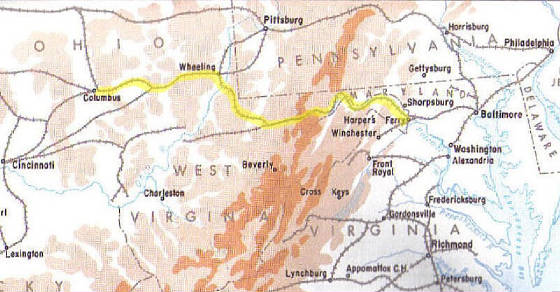
|
The regiment left for Virginia, traveled by rail on the Baltimore & Ohio Railroad for
five days; passing through Ohio, and crossing into West Virginia at Benwoods March 29th, making stops along the way at places
like Grafton, West Virginia and Cumberland, Maryland, to pick up provisions.
.
While at Cumberland, the Regiment had to leave a few men behind who became too ill to travel.
They then continued their journey; finally arriving at Harpers Ferry on the Potomac River.
.
The regiment reached Charles Town, West Virginia on April 2nd, a distance of a reported five
hundred fifty miles.
When they finally got off the railroad cars, the regiment encamped and took a couple days
to rest.
.
Not long after arriving, General Lee's Confederate forces evacuated Petersburg, Va., where they had been holed up on
a long seige of several months, finally being forced out by General Grants' union army.
.
Lee started heading west into Virginia's interior, to try to feed and supply his starving army, while trying to escape
Grant's forces.
| Click on image to make larger |
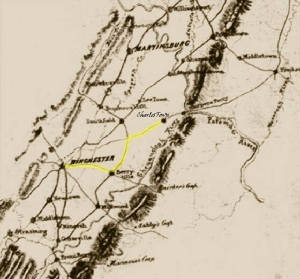
|
| line of march the 196th took from Charles Town |
THE MARCH:
After arriving at Charles Town on April 2, 1865, the 196th were brigaded with three other Ohio regiments, hence becoming
the "2nd Ohio Brigade".
.
They were brigaded with these regiments only for a short while, the other regiments had already been stationed in Charles
Town for about three weeks and had been transferred from the 2nd Brigade, 1st Provisional Division, Army of the Shenandoah
and reassigned to the 2nd Brigade, 2nd Provisional Division Army of the Shenandoah, they were:
.
191st. O.V.I. commanded by Col. Robert L. Kimberly
192nd O.V.I. commanded by Col. Frances W. Butterfield
193rd. O.V.I. commanded by Col. Eugene Powell
.
The 196th had a chance to rest for only two days before the Brigade received orders to march up the valley to Winchester,
where there was a large concentration of troops forming to intercept Lee.
.
No hardships were greater for the men then those of the march, summers brought on humid weather and dusty roads and winter
weather made some roads almost impassable.
.
The Virginia spring weather that time of year was cold and had already persisted in saturating the unpaved roads, turning
them into mud pits making it difficult for animal and man alike to traverse.
.
They did what was known during the civil war as "Heavy Marching", this kind of March was ordered when the Brigade had
to move their camp. The heavy marching consisted of the soldiers carrying all their possessions, musket and equipage with
them, which could weigh up to fifty to sixty pounds on their backs, weighing them down as they marched in the cold wet weather,
sinking them deeper in the muddy roads, with the cold rain soaking them through their heavy woolen uniforms to their skin
chilling them to the bone.
.
"Light Marching", is when they carried only their musket, ammunition, haversack, and canteen, usually on their way to
Picket Duty or Battle.
.
The brigade would have started in regular military order; four abreast at first, but after a short while would usually
be dispersed all over the road. The Regiments wagons followed behind each Regiment.
.
This kind of marching fatigued the soldiers very quickly; usually several halts of an hour or half-hour each were made
to allow the men to rest or search for water, some would fall off along the way side to rest on their own only to catch up
later, these were the stragglers and it was very common on long marches up to eight miles or more.
.
At the end of each days march, the men would have no choice but to bed down in the terrible weather conditions. This
invited all kinds of illness and disease, causing several of the men to become sick, in some cases for life.
:
Thomas Thompson of Co. G: started showing
signs of Gastritis, a (stomach ailment) common among soldiers. Whenever he ate something, he would vomit it back up and suffered
with diarrhea continuously.
:
Captain Reuben C Berger stated in Thomas’ post war widows pension that: I think
the disease was contracted from exposure and poor diet on the march from Charles Town to Winchester, Virginia. There was a
good deal of rain the boys were much exposed to the weather.
Thompson was a good soldier and did his duty well until he was taken sick.
.
Norman Wertman of Co. A makes two diary entries regarding
the march;
.
April 4th 1865
Started up the valley on a raid to stop Lee, I marched
18 miles and encamped at Burryvill(Berryville, Va.), shoulders are pretty tired
.
April 5th 1865
again started up the valley and went to Winchester and then stopped and struck
tents.
.
Sometime at or near this point, the orders to intercept Lee must have been rescinded, the 196th never went any further
south then Winchester, Virginia.
.
Winchester was an important rail connection that had been held by Union forces since late 1864.
.
The 196th remained in camp at Winchester for approximately three
weeks, when they were ordered to Stephenson's Station, as mentioned in Wertman's diary.
.
Norman Wertman diary entry dated:
April 27th 1865
we were on review and as we got to camp the bugle
sounded for to strike tents and marched to Stephenson Station and encamped.
.
Wertman states that they moved camp at least two more times, on April 28th and again on April 29th.
| Click image to make larger |
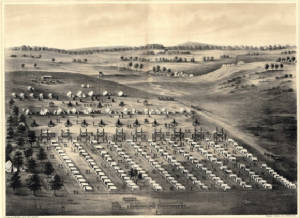
|
| 196th OVI Camp, sketched by Albert Ruger of Co. E |
STEPHENSON'S DEPOT:
The Depot was a little red brick building just north of Winchester, Va. and was also referred
to as Stephenson"s Station, and was the site of many Union encampments.
.
The 196th arrived there about April 27th, where Brigadier Gen Stevenson ordered them to report
to Gen. Brooke.
.
The Regiment began to settle in for garrison duty, by setting up camp.
They began by pitching their tents in even rows by company battle order, not in perspective
alphabetical order as one might perceive.
Typically the captains tents were set up at the beginning of each row.
The soldiers tents were packed, housing up to five or six men.
.
While in camp, the men would spend each monotonous day rising to reveille at about sunrise,
just one of about a dozen camp calls.
.
After roll call was taken, they would get cleaned up and eat breakfast with their mess mates,
usually about four of them, followed by sick call, "also known as Surgeon's Call", then they would clean camp, each company
would be in charge of keeping their own street clean and organized.
.
When done, the first sergeant would assign “Picket Duty” to the men, this was
called “Guard Mounting”, no Privates were excluded from this.
.
Picket duty was for the protection of the regiment or brigade, this was done by posting sentinels
in three lines around the camp.
The first, referred to as the “Advance Picket” was placed one to two miles from
camp for about two hours each time out, and usually for one or two days at a time keeping watch for anything unusual.
.
The second line was referred to as the “Second Guard” and were closer to camp.
.
The third was referred to as the “Rear Guard” and were assigned to the perimeter
of the camp, they couldn’t take orders from anyone except those officers who were in the guard party.
After the duties were assigned, it was time for drill; learning how to be a soldier.
.
The men would target practice, learn how to load and clean their muskets, and what actions
to take after each order was given, this drill usually lasted till lunch time, after they ate lunch, they were allowed some
free time followed by more drill which lasted until late afternoon, at which time the men were dismissed until the next morning
at reveille.
.
A typical Union ration was a pound of beef, sometimes rancid, or salt pork, a little bit of
bread, commonly ¾ of a pound of hardtack or cornmeal.
.
Hardtack was a large soda cracker about three inches in diameter and hard as a rock, the only
way to eat these was to soak them in water or fry them in grease, most of the cooking was done over an outside fire.
.
The men were left to battle the boredom of camp life.
They did this by playing games, such as cards, baseball, dominoes, checkers, etc.
They would wash their clothes, tell stories of war and life back home, or they would
read or in most cases be read to, unless your Albert Ruger of Co. E, he spent his time sketching an over view of Camp Chase
and The Camp of the 196th at Stephenson’s Depot.
.
Men spent more time writing letters to family and friends, and
hoping to receive them than any other leisure activity, some of the men would venture into Winchester to indulge themselves
any way they could by drinking and gambling etc.
Below: Is an example of a standard pass issued to the men by their commanding officer
whenever they wished to visit town, in this case, this pass was issued July 6th 1865 to Privates Norman Wertman and Andrew
Greenwald to visit Winchester

The 196th spent three months at Stephenson Depot, the men had to sleep on the ground,
sometimes in cold and muddy conditions, and were sheltered from the inclement spring and summer weather by only canvas tents,
many of them became sick, the 196th lost one man to illness at Stephenson's Depot, eighteen year old William Walters from
Co. H.
.
When the Post Hospital couldn't handle the number of sick, they would send the others to the large
hospital at Cumberland, Md. and a number of the 196th's men wound up there, approximately 29 men of the 196th were medically
discharged, men who were to sick to re-join thier Regiment, like at Camp Chase, three other soldiers lost thier lives there.
:
David J Skinner: Here's a quote from David J. Skinner, believed
to be Homer D Skinner of Co. C, of the 196th about the conditions at Stevenson's Depot:
:
"He became disabled in June of 1865 while stationed at Stevenson Station, WV., from the
exposures of camp and field life, lying on the ground in the wet, rain, mud, etc., without proper covering or protection,
he contracted several severe colds, which seemed to settle in and effect his heart, throat, and lungs causing hawking, spitting
up, nose running, pains and ________ in head, throat, ________ and lungs - seemed to have a chronic cold and continued to
so complain and suffer and be unfit for duty more or less on said ______ up to his discharge."
:
END OF THE WAR:
On April 9th, while encamped at Winchester, the regiment received the news that Grant's Union
forces had successfully negotiated Gen. Lee’s surrender of his army, just one hundred eighty miles away at Appomattox
Court House, signaling the end of the war.
.
In the days after the surrender of Lee’s forces, the regiments stationed in the Winchester
vacinity, including the 196th, witnessed hundreds of Confederates who came into the union camps to surrender themselves.
.
There were still Confederate armies in the field at this time, but they were in the deep south,
the area that the 196th was stationed in was the northern part of the Shenandoah valley in northern Virginia, this area still
had small bands of Confederate guerrillas running loose.
.
One of the best known Confederate guerrilla leaders was Colonel John S Mosby of “Mosby’s
Rangers”, he and his guerrilla’s conducted raids in an area just on the other side of the Blue Ridge mountains
from Winchester where the 196th was stationed.
.
On April 15th, the 196th received the news that President Lincoln had just been assassinated
in Fords Theatre the night before in Washington D.C., seventy five miles away, his assassin escaping in the commotion that
followed.
.
There were rumors of evidence that Mosby had knowledge of John Wilkes Booth’s plans
to assassinate President Lincoln and that he had been in Washington with him.
.
It had also been reported that they were making plans to escape, so in the days following
Lincolns assassination, Union forces including the 196th was put on alert to watch for Mosby, Booth, or any of Booths conspirators
coming into their lines.
.
Booth was captured a few days later south of Washington.
Mosby it turned out, had no part in the assassination.
.
Mosby himself entered into negotiations to surrender his force on April 20th, and when Mosby
didn't show, the 196th was once again put on alert to watch for Mosby or his men, but it turns out that instead of surrendering
his force, Mosby simply disbanded them, on April 21st.
.
several of Mosby's men came into Winchester to receive their paroles under the terms of surrender set down by Gen Grant.
:
MOVING OUT AGAIN:
On July 27th 1865, the 196th was ordered to leave their
camp near Stephenson Depot.
.
Wertman made three diary entries regarding thier departure:
.
July 27th 1865
We left the Station and got on
the cars and went to Harpers Ferry.
.
July 28th 1865
We arrived at the Relay House and
lay all day on the cars and at night we left the cars and struck tents on the hill.
.
July 29th
We left camp and went to the Block House
.
They traveled on rail cars by way of Harpers Ferry to Fort Federal Hill in Baltimore, Maryland for
Garrison duty, except for Companies A, C, and K which were sent to Riley House also in Baltimore, for duty there.
.
After spending almost two weeks there,companies F,I, and K were ordered to move on August twelfth by boat to Fort Delaware,
later joined by Company G., arriving there the next day for garrison duty.
Fort Delaware is located on Pea Patch Island in the Delaware river, one mile east of Delaware
city, Delaware.
.
The 196th replaced the 201st and 215th Pennsylvania Infantry's, who were ordered to be mustered
out at the end of July, and were assigned to guard the remaining two prisoners.
Both were members of Jefferson Davis' entourage, who were captured May 10th at Irwinville,
Georgia.
.
One was Col. Frank Lubbock and the other was Burton Harrison, who held the rank of Col. and
was Davis' private secretary, he was remanded to Fort Delaware for safekeeping after his capture.
.
Col. Harrison was ordered to be put in solitary confinement and have no contact with anyone,
he wasn't even allowed to use the post library, this treatment of him was thought to be to extreme by some of the Union forces
garrisoned there including 196th and even by the Commander of the Fort, Gen Schoepf, who became close friends with him.
.
The 196th spent only eleven days there, and were the last volunteer regiment to leave
the Fort.
.
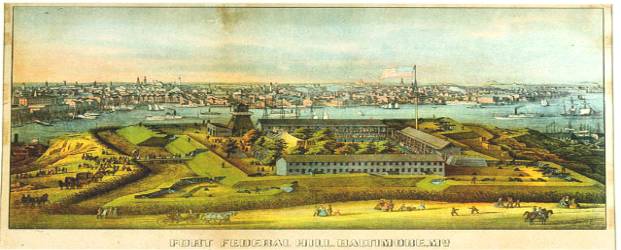
Above: Fort Federal Hill, where the 196th Regiment mustered out
MUSTERING OUT
The regiment was ordered once again to "Move Out" on August twenty fourth, to Wilmington,
Delaware, where they spent their last two weeks of service before receiving "Special Order #41 from the Head Quarters of the
Military Department dated September 2nd 1865, ordering them back to Baltimore to be mustered out.
:
Over the next three weeks, the 196th underwent their
final days in the Federal service. It was very hot during those remaining days in Baltimore. They had to undergo company inspections,
and during this time they mustered for pay. On Sept. 1, they drew ten days rations, and finally on Monday the 4th at eleven
a.m., they received the long awaited news of their going home.
.
The next day they were ordered to move to Fort Federal Hill in Baltimore and on the 7th they turned over their tents
and later that day they were joined by the three other companies that had been garrisoned at Fort Delaware.
.
On Monday Sept. 11, at 4 o'clock p.m., the 196th was mustered out with a strength of 792 men, by Major W. H. Wharton
Commanding Muster Officer of The Middle Military Department.
.
Two days later at four a.m. the regiment boarded the trains and left Baltimore for Ohio, crossing the Ohio River at Benwood,
West Virginia on the 15th, and arriving at Columbus the next day they were marched out to Camp Chase where they had to turn
over their arms and mustered for pay for the very last time.
.
Their last couple of days at Camp Chase, the weather was pretty cold and rainy and on September 20th they were all discharged
and started for home.
.
The 196th lost no soldiers to combat deaths, but unfortunately they
did lose twenty five men to disease.
|
